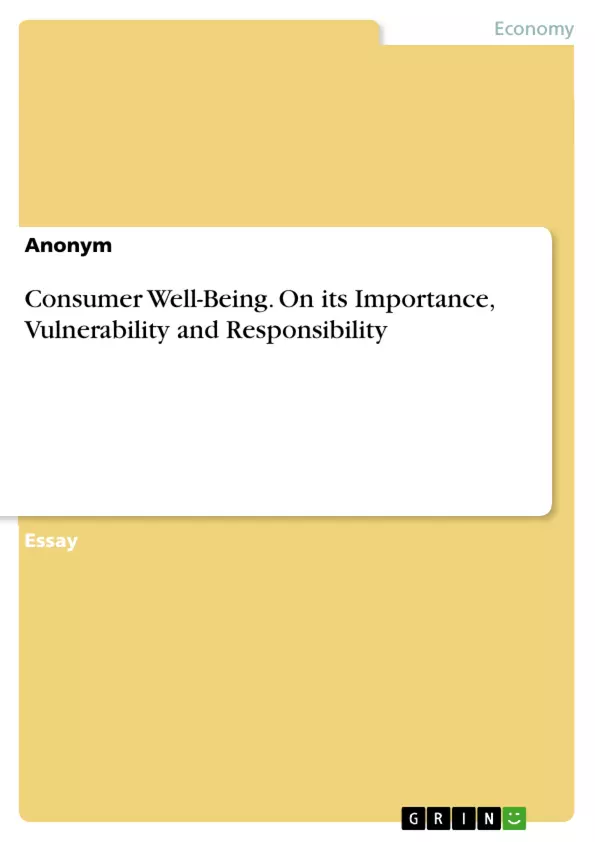This essay focuses on the increasingly important role of the consumers for their own well-being, as certain consumer behaviours tend to assist and increase their own well-being. The essay will discuss to what extent the consumers should be responsible for their own well-being in the context of family, debt and food. After that it will consider consumer vulnerability and its implications for the consumer’s responsibility. The research is based on secondary data from books, newspapers, journals and websites.
Consumption is a main activity of being a part of the society. Every day consumers interact within the marketplace. In this context it is important to think about the consumer’s well-being. This well-being is fundamental in every marketing context but comes along with various challenges. In fact, it is critical to identify the responsible parties.
Inhaltsverzeichnis (Table of Contents)
- Introduction
- Family well-being
- Debt
- Food well-being
Zielsetzung und Themenschwerpunkte (Objectives and Key Themes)
This essay focuses on the role of consumers in taking responsibility for their own well-being, exploring their responsibility in the context of family, debt, and food. The research is based on secondary data from books, newspapers, journals, and websites.
- Consumer Responsibility for Well-being
- Family Well-being and Consumption
- Debt and Consumer Behavior
- Food Well-being and Consumer Choices
- The Influence of Companies and Governments
Zusammenfassung der Kapitel (Chapter Summaries)
Family well-being
The family is a key factor in consumer well-being, and family members face challenges such as time constraints and poverty. Consumers are responsible for maximizing family time, strengthening family relationships, and coping with poverty. This involves balancing work and family time, engaging in family activities, and utilizing coping strategies to deal with financial hardship. While consumers play a role, companies and governments have a responsibility to provide support through flexible work arrangements, policies, and initiatives that improve family well-being.
Debt
Debt is a significant factor in consumption, and social pressures often lead to reliance on debt. Consumers should understand the risks associated with debt, make informed spending decisions, and engage in self-control strategies. Financial corporations and the government also have a responsibility to support consumers by providing financial guidance, regulating credit practices, and offering education programs to promote financial literacy.
Food well-being
Food well-being (FWB) emphasizes the importance of food in overall consumer well-being. Consumers are responsible for acquiring food literacy and engaging in healthy food socialization within their families. This involves understanding the role of healthy food and making informed consumption decisions. However, companies and the government influence the food environment through marketing, availability, and policy. They have a responsibility to promote healthy food choices, improve access to healthy food, and educate consumers about healthy eating habits.
Schlüsselwörter (Keywords)
The primary keywords and focus topics include consumer well-being, family well-being, debt, food well-being, consumer responsibility, financial literacy, food socialization, and the role of companies and governments in influencing consumer behavior.
Frequently Asked Questions
What is 'Food Well-Being' (FWB)?
FWB emphasizes the psychological and physical health benefits of informed food choices and positive food socialization within families.
How does debt impact consumer well-being?
Debt often results from social pressure and lack of self-control, leading to stress and reduced quality of life, requiring financial literacy for management.
Who is responsible for consumer well-being?
While consumers are responsible for their own choices, companies and governments also share responsibility through fair marketing, education, and supportive policies.
What role does the family play in consumption?
The family is a central unit where consumption habits are formed; balancing work and family time is crucial for collective well-being.
What are the implications of consumer vulnerability?
Vulnerable consumers (e.g., those in poverty or with low literacy) face higher risks in the marketplace, necessitating stronger government protection and corporate ethics.
- Citar trabajo
- Anonym (Autor), 2016, Consumer Well-Being. On its Importance, Vulnerability and Responsibility, Múnich, GRIN Verlag, https://www.grin.com/document/910238



